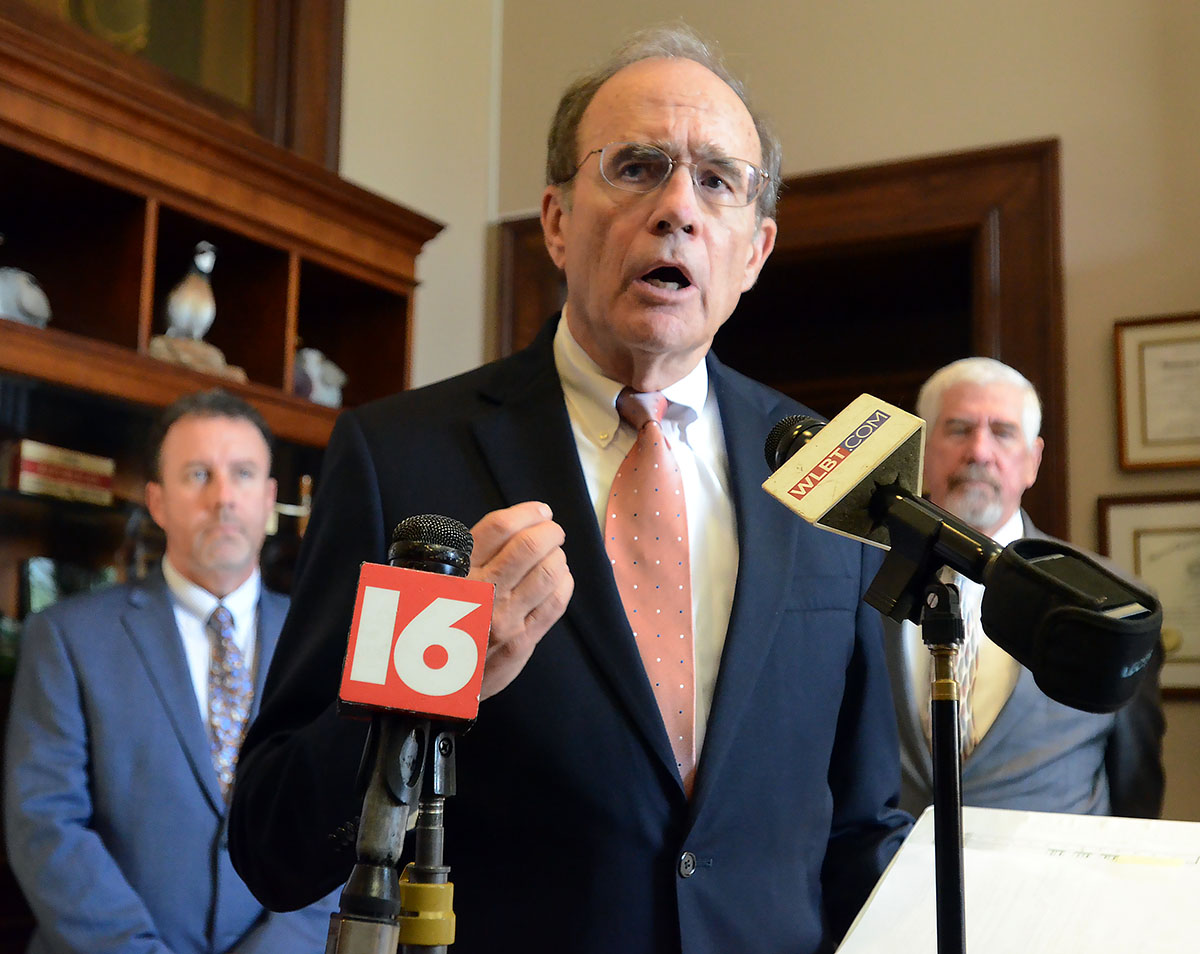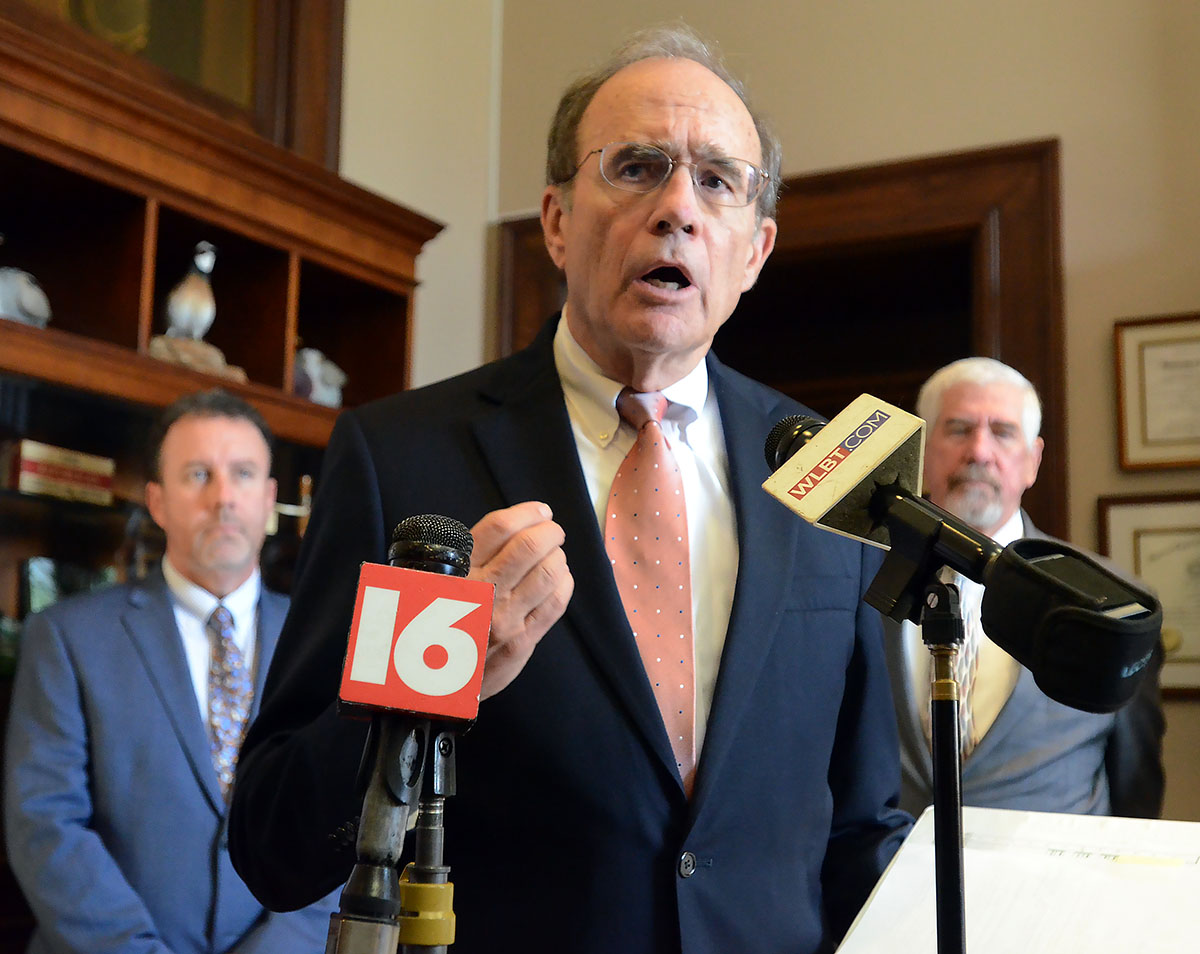Mississippi Today
Remember Lt. Gov. Delbert Hosemann’s plan to save hospitals? Here’s where those bills stand.


Remember Lt. Gov. Delbert Hosemann’s plan to save hospitals? Here’s where those bills stand.
At the beginning of the 2023 legislative session, Lt. Gov. Delbert Hosemann announced a plan to save Mississippi’s failing rural hospitals.
The first-term Senate leader proposed a hodgepodge of grants and programs including four bills costing upwards of $100 million that would grant extra money to hospitals, remove legal barriers to consolidating small hospitals and incentivize the retention of nurses and doctors.
Months later, three of those bills have passed. One is being debated but appears on its way to passage.
The state of Mississippi’s rural health care infrastructure is tenuous. A third of the state’s rural hospitals are at risk of closure, and half of those in a few years, according to a report by the Center for Healthcare Quality and Payment Reform. Their closures could spell devastation for the communities they serve, in a state with some of the worst health outcomes in the country.
READ MORE: The death of rural hospitals could leave Mississippians ‘sick, sick, sick’
Hosemann said he spoke with statewide hospital and health care leaders in developing the plan. Notably, he steered away from floating Medicaid expansion, which would draw down more than a billion dollars from the federal government.
But he did voice support for extending postpartum Medicaid coverage and wanted to work with the state Division of Medicaid and Gov. Tate Reeves to increase reimbursements to hospitals. Both those goals were accomplished, with the Legislature extending postpartum coverage to 12 months in February, and reimbursements to hospitals have increased, though only by about $40 million, a far cry from the $230 million health care experts say they need. Hospital administrators are waiting to see if the difference will be made up by grants from the Legislature.
As of Tuesday, both chambers have passed Senate Bill 2372, which establishes the hospital grant program, and House Bill 271, the appropriations bill that funds it. Senate Medicaid Chairman Kevin Blackwell, R-Southaven, told lawmakers that $700,000 would go to the Department of Health to administer the program, and the rest, $103 million, would go to hospitals.
On the Senate floor on Monday, debate about the hospital grants turned into a debate about broader Medicaid expansion and how the proposed grant program doesn’t do enough to help hospitals. Several Democratic senators pointed out the $103 million could be just as easily spent as the state’s match for federal Medicaid dollars under expansion.
READ MORE: Mississippi leaving more than $1 billion per year on table by rejecting Medicaid expansion
“Less than 30 minutes ago, the governor of red North Carolina signed a bill to expand Medicaid,” Sen. David Blount, D-Jackson, said on Monday. “You can put $100 million in this fund for hospitals and have $100 million, or you can put $100 million over here, and have $1 billion for hospitals.”
As lawmakers enter the final few days of the 2023 legislative session, here’s where Hosemann’s legislation stands. Because the state budget hasn’t been finalized as of Tuesday, details about exact amounts are still subject to some change.
- Senate Bill 2371: Provide between $16 million and $25 million to help with hospital residency and fellowship programs, as well as a nursing/allied health community college grant program. The bill aims to help retain doctors — the majority of doctors remain in the places they do their residencies — and increase Mississippi’s nursing workforce. The bill passed in the Senate on Monday, but the amount of money going toward the programs is still not final.
- Senate Bill 2372: Establish the Mississippi Hospital Sustainability Grant Program, which would provide extra money to aid the state’s struggling hospitals. The Senate’s bill establishes rules and regulations for the grant program, while House Bill 271 will fund the program. Lawmakers decided Monday that they’d send $104 million to hospitals, up from $80 million the Senate approved earlier in the session. The details of the grant program laid out in the Senate bill were released and passed on Tuesday.
- Senate Bill 2373: Provide $6 million for a nurse loan repayment program, to aid the state’s substantial shortage. Mississippi’s nurse turnover and vacancy rates are at their highest in at least a decade. The bill was passed and signed into law by Gov. Tate Reeves in early March.
- Senate Bill 2323: Amend current laws to allow the consolidation of hospitals. Hosemann previously said the state’s health care system needs to be revamped to be more financially viable. The bill has passed and awaits Reeves’ signature or veto by March 30.
Mississippi Today’s Geoff Pender contributed to this report.
This article first appeared on Mississippi Today and is republished here under a Creative Commons license.
Mississippi Today
Speaker White wants Christmas tree projects bill included in special legislative session

House Speaker Jason White sent a terse letter to Lt. Gov. Delbert Hosemann on Thursday, saying House leaders are frustrated with Senate leaders refusing to discuss a “Christmas tree” bill spending millions on special projects across the state.
The letter signals the two Republican leaders remain far apart on setting an overall $7 billion state budget. Bickering between the GOP leaders led to a stalemate and lawmakers ending their regular 2025 session without setting a budget. Gov. Tate Reeves plans to call them back into special session before the new budget year starts July 1 to avoid a shutdown, but wants them to have a budget mostly worked out before he does so.
White’s letter to Hosemann, which contains words in all capital letters that are underlined and italicized, said that the House wants to spend cash reserves on projects for state agencies, local communities, universities, colleges, and the Mississippi Department of Transportation.
“We believe the Senate position to NOT fund any local infrastructure projects is unreasonable,” White wrote.
The speaker in his letter noted that he and Hosemann had a meeting with the governor on Tuesday. Reeves, according to the letter, advised the two legislative leaders that if they couldn’t reach an agreement on how to disburse the surplus money, referred to as capital expense money, they should not spend any of it on infrastructure.
A spokesperson for Hosemann said the lieutenant governor has not yet reviewed the letter, and he was out of the office on Thursday working with a state agency.
“He is attending Good Friday services today, and will address any correspondence after the celebration of Easter,” the spokesperson said.
Hosemann has recently said the Legislature should set an austere budget in light of federal spending cuts coming from the Trump administration, and because state lawmakers this year passed a measure to eliminate the state income tax, the source of nearly a third of the state’s operating revenue.
Lawmakers spend capital expense money for multiple purposes, but the bulk of it — typically $200 million to $400 million a year — goes toward local projects, known as the Christmas Tree bill. Lawmakers jockey for a share of the spending for their home districts, in a process that has been called a political spoils system — areas with the most powerful lawmakers often get the largest share, not areas with the most needs. Legislative leaders often use the projects bill as either a carrot or stick to garner votes from rank and file legislators on other issues.
A Mississippi Today investigation last year revealed House Ways and Means Chairman Trey Lamar, a Republican from Sentobia, has steered tens of millions of dollars in Christmas tree spending to his district, including money to rebuild a road that runs by his north Mississippi home, renovate a nearby private country club golf course and to rebuild a tiny cul-de-sac that runs by a home he has in Jackson.
There is little oversight on how these funds are spent, and there is no requirement that lawmakers disburse the money in an equal manner or based on communities’ needs.
In the past, lawmakers borrowed money for Christmas tree bills. But state coffers have been full in recent years largely from federal pandemic aid spending, so the state has been spending its excess cash. White in his letter said the state has “ample funds” for a special projects bill.
“We, in the House, would like to sit down and have an agreement with our Senate counterparts on state agency Capital Expenditure spending AND local projects spending,” White wrote. “It is extremely important to our agencies and local governments. The ball is in your court, and the House awaits your response.”
This article first appeared on Mississippi Today and is republished here under a Creative Commons Attribution-NoDerivatives 4.0 International License.
Mississippi Today
Advocate: Election is the chance for Jackson to finally launch in the spirit of Blue Origin

Editor’s note: This essay is part of Mississippi Today Ideas, a platform for thoughtful Mississippians to share fact-based ideas about our state’s past, present and future. You can read more about the section here.
As the world recently watched the successful return of Blue Origin’s historic all-women crew from space, Jackson stands grounded. The city is still grappling with problems that no rocket can solve.
But the spirit of that mission — unity, courage and collective effort — can be applied right here in our capital city. Instead of launching away, it is time to launch together toward a more just, functioning and thriving Jackson.
The upcoming mayoral runoff election on April 22 provides such an opportunity, not just for a new administration, but for a new mindset. This isn’t about endorsements. It’s about engagement.
It’s a moment for the people of Jackson and Hinds County to take a long, honest look at ourselves and ask if we have shown up for our city and worked with elected officials, instead of remaining at odds with them.
It is time to vote again — this time with deeper understanding and shared responsibility. Jackson is in crisis — and crisis won’t wait.
According to the U.S. Census projections, Jackson is the fastest-shrinking city in the United States, losing nearly 4,000 residents in a single year. That kind of loss isn’t just about numbers. It’s about hope, resources, and people’s decision to give up rather than dig in.
Add to that the long-standing issues: a crippled water system, public safety concerns, economic decline and a sense of division that often pits neighbor against neighbor, party against party and race against race.
Mayor Chokwe Antar Lumumba has led through these storms, facing criticism for his handling of the water crisis, staffing issues and infrastructure delays. But did officials from the city, the county and the state truly collaborate with him or did they stand at a distance, waiting to assign blame?
On the flip side, his runoff opponent, state Sen. John Horhn, who has served for more than three decades, is now seeking to lead the very city he has represented from the Capitol. Voters should examine his legislative record and ask whether he used his influence to help stabilize the administration or only to position himself for this moment.
Blaming politicians is easy. Building cities is hard. And yet that is exactly what’s needed. Jackson’s future will not be secured by a mayor alone. It will take so many of Jackson’s residents — voters, business owners, faith leaders, students, retirees, parents and young people — to move this city forward. That’s the liftoff we need.
It is time to imagine Jackson as a capital city where clean, safe drinking water flows to every home — not just after lawsuits or emergencies, but through proactive maintenance and funding from city, state and federal partnerships. The involvement of the U.S. Environmental Protection Agency in the effort to improve the water system gives the city leverage.
Public safety must be a guarantee and includes prevention, not just response, with funding for community-based violence interruption programs, trauma services, youth job programs and reentry support. Other cities have done this and it’s working.
Education and workforce development are real priorities, preparing young people not just for diplomas but for meaningful careers. That means investing in public schools and in partnerships with HBCUs, trade programs and businesses rooted right here.
Additionally, city services — from trash collection to pothole repair — must be reliable, transparent and equitable, regardless of zip code or income. Seamless governance is possible when everyone is at the table.
Yes, democracy works because people show up. Not just to vote once, but to attend city council meetings, serve on boards, hold leaders accountable and help shape decisions about where resources go.
This election isn’t just about who gets the title of mayor. It’s about whether Jackson gets another chance at becoming the capital city Mississippi deserves — a place that leads by example and doesn’t lag behind.
The successful Blue Origin mission didn’t happen by chance. It took coordinated effort, diverse expertise and belief in what was possible. The same is true for this city.
We are not launching into space. But we can launch a new era marked by cooperation over conflict, and by sustained civic action over short-term outrage.
On April 22, go vote. Vote not just for a person, but for a path forward because Jackson deserves liftoff. It starts with us.
Pauline Rogers is a longtime advocate for criminal justice reform and the founder of the RECH Foundation, an organization dedicated to supporting formerly incarcerated individuals as they reintegrate into society. She is a Transformative Justice Fellow through The OpEd Project Public Voices Fellowship.
This article first appeared on Mississippi Today and is republished here under a Creative Commons Attribution-NoDerivatives 4.0 International License.![]()
Mississippi Today
On this day in 1959, students marched for integrated schools

April 18, 1959

About 26,000 students took part in the Youth March for Integrated Schools in Washington, D.C. They heard speeches by Martin Luther King Jr., A. Phillip Randolph and NAACP leader Roy Wilkins.
In advance of the march, false accusations were made that Communists had infiltrated the group. In response, the civil rights leaders put out a statement: “The sponsors of the March have not invited Communists or communist organizations. Nor have they invited members of the Ku Klux Klan or the White Citizens’ Council. We do not want the participation of these groups, nor of individuals or other organizations holding similar views.”
After the march, a delegation of students went to present their demands to President Eisenhower, only to be told by his deputy assistant that “the president is just as anxious as they are to see an America where discrimination does not exist, where equality of opportunity is available to all.”
King praised the students, saying, “In your great movement to organize a march for integrated schools, you have awakened on hundreds of campuses throughout the land a new spirit of social inquiry to the benefit of all Americans.”
This article first appeared on Mississippi Today and is republished here under a Creative Commons Attribution-NoDerivatives 4.0 International License.![]()
-

 Mississippi Today6 days ago
Mississippi Today6 days agoLawmakers used to fail passing a budget over policy disagreement. This year, they failed over childish bickering.
-

 Mississippi Today6 days ago
Mississippi Today6 days agoOn this day in 1873, La. courthouse scene of racial carnage
-

 Local News7 days ago
Local News7 days agoAG Fitch and Children’s Advocacy Centers of Mississippi Announce Statewide Protocol for Child Abuse Response
-

 Local News6 days ago
Local News6 days agoSouthern Miss Professor Inducted into U.S. Hydrographer Hall of Fame
-

 News from the South - Alabama News Feed4 days ago
News from the South - Alabama News Feed4 days agoFoley man wins Race to the Finish as Kyle Larson gets first win of 2025 Xfinity Series at Bristol
-

 News from the South - Alabama News Feed5 days ago
News from the South - Alabama News Feed5 days agoFederal appeals court upholds ruling against Alabama panhandling laws
-

 Our Mississippi Home7 days ago
Our Mississippi Home7 days agoFood Chain Drama | Our Mississippi Home
-

 News from the South - North Carolina News Feed7 days ago
News from the South - North Carolina News Feed7 days agoHelene: Renewed focus on health of North Carolina streams | North Carolina


















































